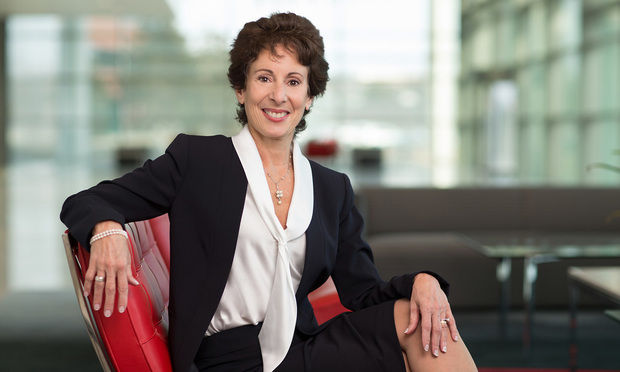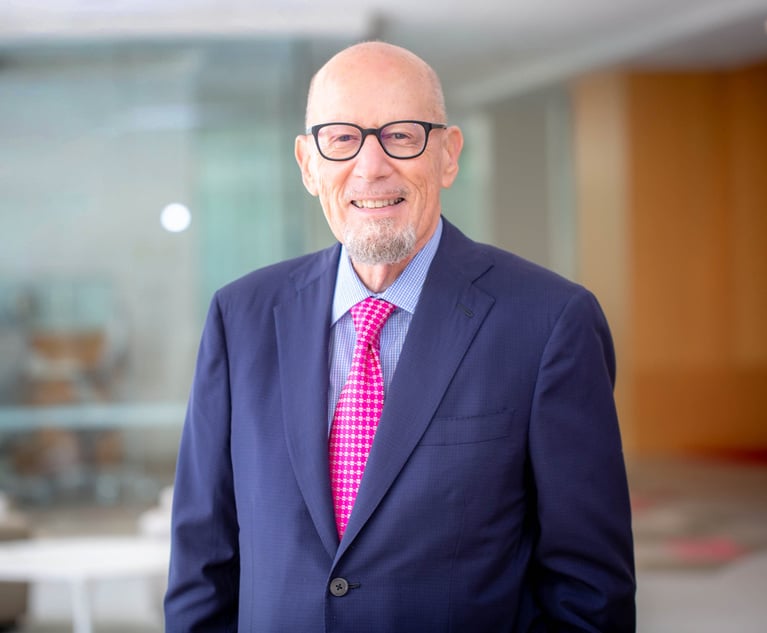Q&A: TD's Ellen Koplow on Setting Standards and Preparing for Change
The TD Ameritrade general counsel reflects on women in power, how to lead and what women can gain by understanding the role of wealth.
March 01, 2018 at 07:11 PM
7 minute read

Editor's note: This is the second in a series of Q&As with leading women in the legal profession, in honor of National Women's History Month. They were conducted and written by the legal recruiting firm Major, Lindsey & Africa.
Ellen Koplow, the executive vice president, general counsel and secretary of TD Ameritrade, started her legal career in private practice. She spent the first 15 years of her professional career developing her private practice and became managing partner of the Columbia, Maryland, office of Miles and Stockbridge at age 35. At 39, Ellen was approached to go in-house at TD Ameritrade by its general counsel to help develop the legal department and support the growing technology group. “At that point, I had created a good career with a good reputation in the community, so I decided to see where a new path might take me,” she says. In November 2000, she was named acting general counsel, and in 2001, she became general counsel.
Who helped you the most on your career path?
I was fortunate to have had peers and supervisors who saw potential in me. In private practice, it was the prior managing partner of the office who came to me and said I should be the next managing partner. It wasn't anything I set a goal to attain, but he saw this opportunity for me that I would not have seen for myself. Similarly, it was a woman who I previously worked with who approached me to go in-house with her. And as GC, the CEOs I've been fortunate to work with have always been very supportive and provided me opportunities I might not have seen for myself.
Were there any moments early in your career that surprised you in terms of how you were treated? What struggles did you encounter and how did you overcome those roadblocks in your career?
The biggest struggle, in looking back, was trying to find a way to meet the standards I set for myself in both my personal and professional life, as a wife, mother and lawyer. It's constant, it's energizing and it's tiring.
Addressing client expectations has always been important, and there have been times when those expectations differed between me and my male peers. There was a time when I was in private practice where a large international client made the assumption that I would not be returning to work after I had my first child. I was so taken aback by that assumption that I called him up and told him, in a respectful way, to never doubt my focus and commitment to being his lawyer and being the best there can be…and, of course, I'd be coming back. I recall him being appreciative of the call, but it was a call that my male colleagues would never have had to make.
Later in my career, I worked with an executive coach who helped me to realize the true amount of control we have over how we spend our time. It was a turning point in the perspective I brought to my work and home life that allowed me to work better without continually feeling I needed to work harder.
What has been your greatest challenge as the general counsel of TD Ameritrade? What keeps you up at night?
Since 1999, it's just been constant change, especially in financial services, since we operate mostly online. The laws and society's expectations around the internet, operating via mobile apps, innovation, financial services, the economy, politics, etc., are constantly changing. It's taking this constant churn and leading throughout in a positive way that is challenging. Keeping that energy going around all these areas requires continual focus.
How important is it to your organization to have women in leadership?
It is very important to TD Ameritrade to have women in leadership. We spend a fair amount of time making sure we have a fair promotion system, measuring it, rewarding our associates for their work in this area and making sure we have initiatives to support women and other diverse groups. We make sure the leadership team is watching it and that our great HR team is supporting it. Over time, it's gotten stronger and stronger.
How do you or your organization help women advance in the workplace and the legal profession?
We started our women's initiative more than 10 years ago and from there it developed into several women's groups to address issues of concern to our women associates. The women's initiatives have since evolved into our current diversity and inclusion initiatives, with inclusiveness being a large and important part of our culture.
What I've learned from working in a financial services company is that if women understand the importance of wealth, not from a greedy perspective, but as a thread in the fabric of what creates stability in your life, if women would not be fearful of their financial selves, then that understanding and comfort with this aspect of their lives could help them in many ways. It would help them to speak when negotiating their salary or when they deserve a promotion; to invest prudently as a way to increase wealth over time; and overall to create a more stable life for themselves and their families.
A few years ago I approached the University of Maryland (where I received my undergraduate degree) because I continued to be frustrated over the pay gap and believed that young women needed to better understand their financial selves as they started their careers. The university was enthusiastic and ran a program with the support of TD Ameritrade where in the fall they had a speaker come in to discuss financial management and investment, and in the spring they offered a course on gender, finance and power.
The students reacted wonderfully to it; at the beginning of class, most have no clue what financial health is, how to even begin investing and what it means to invest in a 401(k). They have no lens into the fact that women live longer and get paid less and can end up in difficult financial straits if they are not watching their financial well-being. Just seeing the light bulbs go off in both the men and women students is incredible. Now when these students get their first jobs, they have an understanding of the importance of their salaries, why they should invest in a 401(k) and how to invest in their own futures.
What advice would you give to young lawyers who desire to become a legal leader in a corporation?
Be a good lawyer and learn to be a good leader, which means constant self-evaluation. Always look at how you can be better. We have our whole lives to live, and you need to understand who you are and how you can make yourself the best you can be to yourself and others. Only then can you bring your best self to work and get the best work out of you.
Be authentic, courageous and decisive. Be clear and follow the principles that are important to you. And remember to enjoy yourself along the journey—we always need to do more of that.
This content has been archived. It is available through our partners, LexisNexis® and Bloomberg Law.
To view this content, please continue to their sites.
Not a Lexis Subscriber?
Subscribe Now
Not a Bloomberg Law Subscriber?
Subscribe Now
NOT FOR REPRINT
© 2025 ALM Global, LLC, All Rights Reserved. Request academic re-use from www.copyright.com. All other uses, submit a request to [email protected]. For more information visit Asset & Logo Licensing.
You Might Like
View All
Cozen O'Connor's Bernard Nash Pioneered the Modern State AGs Practice. Now He's Hanging Up His Boots
6 minute read
'Digital Mindset': Hogan Lovells' New Global Managing Partner for Digitalization

Quiet Retirement Meets Resounding Win: Quinn Emanuel Name Partner Kathleen Sullivan's Vimeo Victory

Can a Law Firm Institutionalize Its Culture? Boies Schiller’s New Chairman Will Try
Trending Stories
- 1Uber Files RICO Suit Against Plaintiff-Side Firms Alleging Fraudulent Injury Claims
- 2The Law Firm Disrupted: Scrutinizing the Elephant More Than the Mouse
- 3Inherent Diminished Value Damages Unavailable to 3rd-Party Claimants, Court Says
- 4Pa. Defense Firm Sued by Client Over Ex-Eagles Player's $43.5M Med Mal Win
- 5Losses Mount at Morris Manning, but Departing Ex-Chair Stays Bullish About His Old Firm's Future
Who Got The Work
J. Brugh Lower of Gibbons has entered an appearance for industrial equipment supplier Devco Corporation in a pending trademark infringement lawsuit. The suit, accusing the defendant of selling knock-off Graco products, was filed Dec. 18 in New Jersey District Court by Rivkin Radler on behalf of Graco Inc. and Graco Minnesota. The case, assigned to U.S. District Judge Zahid N. Quraishi, is 3:24-cv-11294, Graco Inc. et al v. Devco Corporation.
Who Got The Work
Rebecca Maller-Stein and Kent A. Yalowitz of Arnold & Porter Kaye Scholer have entered their appearances for Hanaco Venture Capital and its executives, Lior Prosor and David Frankel, in a pending securities lawsuit. The action, filed on Dec. 24 in New York Southern District Court by Zell, Aron & Co. on behalf of Goldeneye Advisors, accuses the defendants of negligently and fraudulently managing the plaintiff's $1 million investment. The case, assigned to U.S. District Judge Vernon S. Broderick, is 1:24-cv-09918, Goldeneye Advisors, LLC v. Hanaco Venture Capital, Ltd. et al.
Who Got The Work
Attorneys from A&O Shearman has stepped in as defense counsel for Toronto-Dominion Bank and other defendants in a pending securities class action. The suit, filed Dec. 11 in New York Southern District Court by Bleichmar Fonti & Auld, accuses the defendants of concealing the bank's 'pervasive' deficiencies in regards to its compliance with the Bank Secrecy Act and the quality of its anti-money laundering controls. The case, assigned to U.S. District Judge Arun Subramanian, is 1:24-cv-09445, Gonzalez v. The Toronto-Dominion Bank et al.
Who Got The Work
Crown Castle International, a Pennsylvania company providing shared communications infrastructure, has turned to Luke D. Wolf of Gordon Rees Scully Mansukhani to fend off a pending breach-of-contract lawsuit. The court action, filed Nov. 25 in Michigan Eastern District Court by Hooper Hathaway PC on behalf of The Town Residences LLC, accuses Crown Castle of failing to transfer approximately $30,000 in utility payments from T-Mobile in breach of a roof-top lease and assignment agreement. The case, assigned to U.S. District Judge Susan K. Declercq, is 2:24-cv-13131, The Town Residences LLC v. T-Mobile US, Inc. et al.
Who Got The Work
Wilfred P. Coronato and Daniel M. Schwartz of McCarter & English have stepped in as defense counsel to Electrolux Home Products Inc. in a pending product liability lawsuit. The court action, filed Nov. 26 in New York Eastern District Court by Poulos Lopiccolo PC and Nagel Rice LLP on behalf of David Stern, alleges that the defendant's refrigerators’ drawers and shelving repeatedly break and fall apart within months after purchase. The case, assigned to U.S. District Judge Joan M. Azrack, is 2:24-cv-08204, Stern v. Electrolux Home Products, Inc.
Featured Firms
Law Offices of Gary Martin Hays & Associates, P.C.
(470) 294-1674
Law Offices of Mark E. Salomone
(857) 444-6468
Smith & Hassler
(713) 739-1250










